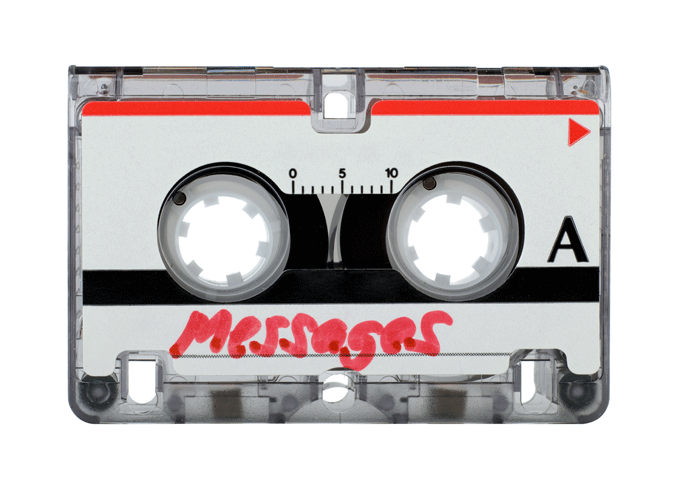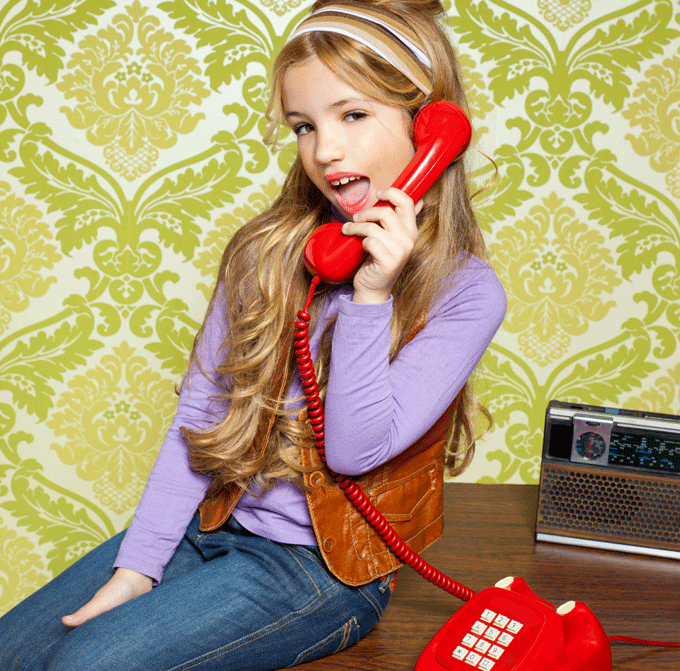My daughter and I recently saw The Giver, a film set in a utopian society that has eliminated its history and the human emotions associated with it. A boy named Jonas is trained by someone called the Giver, an old guy who has stored inside him all the community’s memories—feelings included—and must transfer them to his protégé.
After watching the movie, it occurred to me that people roughly 35 and older should serve as “givers” to the next generation, and the memories we should pass down are that of a former technological age. Think about it: Today’s kids are the very last generation to have parents who were raised before the digital revolution. This is a big responsibility for all of us who were born in 1980 or earlier. Our children need to “receive” this precious knowledge from us, before words like “Xerox” and “collect call” are forgotten and the emotions associated with these experiences have gone the way of the typewriter.
So, in the name of preserving our precious technological past, here are 11 bits of memory, and the emotions once associated with them, that I feel obligated to transfer to my offspring. And, just for the sake of mixing pop-culture metaphors and time periods, I’ll recount this history in the manner of Ted Mosby from the TV sitcom How I Met Your Mother—you know, the guy who took nine seasons to tell his kids the story of how he hooked up with their mom. C’mon, it’ll be fun.
1. We had less privacy. Kids, before wireless phones hit the mainstream, receiving a call at home went down something like this: The family phone rang in the middle of dinner and someone in your family got up to answer it. “It’s for you,” they announced (with a dopey smile if the caller was a boy), as they handed you the receiver. Mortified, you turned your back to your family and slithered as far away from them as the phone cord would allow. Your siblings craned their necks to listen in on your hushed conversation. You put your hand over the mouthpiece and yelled for everyone to give you some space. By the time you completed 10th grade, the 5-foot phone cord had been stretched to a slack 15 feet. Lost emotion: The embarrassment of having your crush on the other end of the line overhear your little brother screaming your bra size across the room.
2. We had more privacy. The best thing about living in those ancient times was that the most public place a friend could post a picture of you was in their own hard-bound photo album. (Sure, you had crappy yearbook photos to contend with, but it wasn’t as bad as anyone being able to upload a dorky photo onto Instagram.) Better yet, it was a real challenge for people to find you when you preferred not to be found. Before mobile devices, it was impossible to reach you if you weren’t home to pick up the phone. On the flip side, it was harder for you to reach someone. If you were out and about, you had to find a pay phone, not to mention a quarter. If your friend didn’t answer, there were only two other ways to locate them: You could call around to mutual friends, or you could walk or drive around town and hunt them down. Stalking someone back then, kids, required real effort. Lost emotion: The terror you experienced in the pre-cell-phone era when your mom got into a fender bender and was an hour late picking you up from grammar school.
3. We had to dig for information. As hard as it was to track someone down, it was even more difficult to track down information. Some households possessed a set of encyclopedias that became outdated the moment they hit the bookshelf. Newspapers and magazines were only as relevant as their printing schedules allowed. The news came on TV only a few times a day. There were no reading tablets and Amazon, so if you wanted to read a book you had to purchase one at a bookstore, or go to a library. But at the library, kids, you got to experience delights such as flipping through those cute little Dewey Decimal cards, hiding in one of the aisles to sneak a peek at a “dirty” book like Judy Blume’s Forever, and scoping out cute boys in the YA section. Research papers were a drag though. Instead of sitting home searching the web, you schlepped massive references books over to the library copy machine, where it would take over two minutes to duplicate a single page. Lost emotion: The dread you felt when you ran out of change for the Xerox machine or that last copy of Lord of the Flies was already checked out.
4. We had to pay for music. Kids, the music store was once the coolest place on earth, because it was where you went to purchase those awesome tunes you could otherwise hear only on the radio. There were no YouTube stars and Kickstarter-funded CDs—the only voices we got to hear were the ones deemed worthy by those all-powerful record companies. We just loved browsing in Sam Goody, Tower Records and other hip hangouts, and once we took that vinyl or cassette tape home, we’d play it over and over again until the record scratched or the tape got tangled in the boom box. Lost emotion: The thrill of ripping the plastic shrink wrap off the new Van Halen cassette and cramming it into our awful car stereo.
5. We had to watch TV shows and films in real time. Likewise, the only way to experience the magic of Hollywood was to go to the movie theater. Later, Blockbuster and cable TV brought the entertainment into your living room, but your parents needed to buy a then-expensive VCR and the viewing choices were still limited (there were only nine cable stations, not 1,389). If you were hooked on a television show, you had to check the TV schedules (printed in the newspaper or TV Guide) and be home at the precise time the program aired. If you missed it, you had to wait for summer reruns. Lost emotion: The excitement of sitting in a theater to watch your favorite movie twice in a row. Because once the film stopped running, you would have to wait three years for it to be shown on TV—with commercial interruptions.
6. Job references were sacred. When we applied for our first jobs, kids, we listed three references, each of whom would be called by our prospective employer. We could prep those folks in advance to be sure they’d gush about us. Nowadays, HR will Google the hell out of you to see what kind of person you are off paper. That Facebook photo of you drinking out of a homemade beer bong in your college dorm? Ms. CEO will find it. What she’ll think of it depends on what kind of job you’re applying for. A Silicon Valley start-up might find your creativity an asset. A stuffy bank might not. Lost emotion: Your relief when, while applying for a job, you confirmed that your first boss was still alive and, even better, vaguely remembered you and the slightly-above-average work you did.
7. We were forced to talk. Kids, something called oxytocin flooded our brains whenever we spoke to another human—especially someone we cared about—over the phone or, better yet, face-to-face. Which means we were actually connecting with one another. Through someone’s voice we could also detect fear, deception, affection and other subtle emotions. Texting has done away with all that; as your thumbs fly over the text pad on your mobile, no neurons fire, no chemistry is shared, and no deeper understanding between you is forged. Lost emotion: The security of knowing, by the tone of someone’s voice, that “hey” isn’t a blow-off, but rather a cautiously optimistic come-on.
8. We could ignore people. Today, it may not be possible to entirely avoid someone. Even a person we’re trying desperately to forget can unexpectedly (or expectedly, after a few glasses of wine) pop up on our mutual friends’ social media pages. But back in the day, if we were angry at our best friend or just broke up with someone, we could go home, slam our bedroom door and physically shut that person out forever (except for when we bumped into them during homeroom). The worst crime we’d commit when we hit rock bottom was drunk phone calling, which has evolved into the much more destructive drunk Facebooking or texting. Remember, kids, your best friends are the ones who take away not only your keys, but also your cell phone, when you’ve had one too many. Lost emotion: The surprise of physically bumping into someone at a restaurant or at the mall—because people weren’t “checking in” on Facebook every 15 minutes.
Even a person we’re trying desperately to forget can unexpectedly (or expectedly, after a few glasses of wine) pop up not only in our dreams, but on our mutual friends’ social media pages.
9. We knew who could write and spell and had pretty handwriting. With no Spellcheck or Autospell at your fingertips, you had to consult something called a dictionary, which lazy people were reluctant to use. Writing thank-you notes and love letters was still common, and upon reading one of those ancient documents you could learn a lot about someone—not to mention distinguish regular people, who had nice handwriting, from those who were destined to become doctors. And kids, when you read things in the paper, you just knew it was all true, because writers went to journalism school back then and had impeccable accuracy and real ethics (ahem). Lost emotion: The superiority you felt over the homecoming queen, because although she had bigger hair and a more expensive car, she couldn’t spell for sh–.
10. Shopping was a pain. Today, if you’re looking for something—even something as random as a coral tank top with mesh inserts emblazoned with the name of your favorite sports team—no problem! Just Google it, and you’re bound to find someone in the world who has it and will sell it to you. The Internet has put fashion at your fingertips, so you can now watch a Paris runway show in real time, order clothes straight from a London retailer, and even buy vintage dresses on consignment from some collector in Idaho—without leaving your bedroom. But back then, kids, if you were looking for shoes to match your prom dress, unless you lived in a big city, you had no choice but to head to the local mall and settle for whatever you could find at Thom McAn. Lost emotion: The exhilaration of finding the perfect rhinestone-encrusted pink pumps to match your dolman-sleeve dress.
11. Storing photos was a bigger pain. Kids, never complain about iPhoto’s lame editing options. Until about 1999, when the magazine I was working at finally converted to digital photography, we editors looked at photos on a light board and even used Polaroid cameras to snap models and clothing samples for photo shoots. At home, you stored your snapshots in bulky photo albums and their negatives in boxes, and, if you didn’t have your own darkroom, you schlepped roles of 35 mm film to the camera shop after a party or vacation. Seriously, you would drop off your film and wait up to a week to pick up your prints. Unfortunately, most of the photos would have red eye or be out of focus, but you had no way of predicting that at the time you were taking the picture. Oh, and if you wanted to send your friend a copy of a photo? You headed back to the camera shop with the negative. Lost emotion: The ecstasy of finding out that just one photo (out of 36 in the roll) is actually frame-worthy.
So you see, kids, how lucky you are to be able to spontaneously shoot a decent selfie and text it to someone within seconds, to read the entire Harry Potter series on your Kindle and, most important, to be within our reach 24 hours a day. I hope that hearing about what we lived through helps you appreciate the immense power you have as a child of the digital era. Remember to use this power wisely, or that iPhone your father and I just gave you will be replaced with a vintage beeper.











2014/09/02 at 11:35 pm
Such a fun story. Love it!!
2014/09/02 at 11:37 pm
This is all so true. Middle School was so much more fun when you had to stalk someone between classes. If we had had Facebook, it wouldn’t have been as interesting.
2014/09/11 at 3:58 pm
Yes! This is awesome and so hilarious. I used to bring the phone into the bathroom (still not enough privacy)! And getting prints of photos! I appreciate the Ted Mosby story-telling, too :) This piece also makes me think about how my parents shared their experiences without TV, but I think our generation is a little more nostalgic about “the way things used to be,” than our parents. Even a cool bike now is one without gears and breaks, like spanky and alfalfa rode. Old-school stuff now is making a comeback. The future could very much look like the past! uh, well, sort-of.